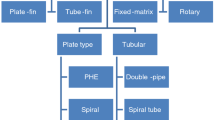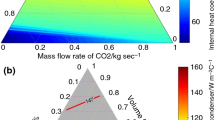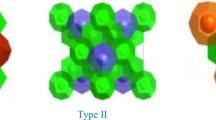Abstract
Ethylene glycol–water mixtures (EGWM) are vital for cooling engines in automotive industry. Scarce information is available in the literature for estimating the heat transfer coefficients (HTC) of EGWM using knowledge-based estimation techniques such as adaptive neuro-fuzzy inference systems (ANFIS) and artificial neural networks (ANN) which offer nonlinear input–output mapping. In this paper, the supervised learning methods of ANFIS and ANN are exploited for estimating the experimentally determined HTC. This original research fulfills the preceding modeling efforts on thermal properties of EGWM and HTC applications in the literature. An experimental test setup is designed to compute HTC of mixture over a small circular aluminum heater surface, 9.5 mm in diameter, placed at the bottom 40-mm-wide wall of a rectangular channel 3 mm × 40 mm in cross section. Measurement data are utilized as the train and test data sets of the estimation process. Prediction results have shown that ANFIS provide more accurate and reliable approximations compared to ANN. ANFIS present correlation factor of 98.81 %, whereas ANN estimate 87.83 % accuracy for test samples.








Similar content being viewed by others
Explore related subjects
Discover the latest articles, news and stories from top researchers in related subjects.References
Kurt H, Kayfeci M (2009) Prediction of thermal conductivity of ethylene glycol-water solution by using artificial neural networks. Appl Energy 86:2244–2248
Kandlikar SG (1997) Heat transfer and flow characteristics in partial boiling, fully developed boiling, and significant void flow regions of subcooled flow boiling, ASME J Heat Transf 120:395–401
Sablani SS, Kacimov A, Perret J, Mujumbar AS, Campo A (2005) Non-iterative estimation of heat transfer coefficients using artificial neural network models. Int J Heat Mass Transf 48:665–679
Manickaraj J, Balasubramanian N (2008) Estimation of the heat transfer coefficient in a liquid-solid fluidized bed using an artificial neural network. Adv Powder Tech 19:119–130
Gandhi AB, Joshi JB (2010) Estimation of heat transfer coefficient in bubble column reactors using support vector regression. Chem Eng J 160:302–310
Amiri S, Mehrnia MR, Barzegari D, Yazdani A (2011) An artificial neural network for prediction of gas holdup in bubble columns with oily solutions. Neural Comput Appl 20:487–494
Al-Hemiri AA, Ahmedzeki NS (2008) Prediction of the heat transfer coefficient in a bubble column using an artificial neural network. Int J Chem React Eng. 6:A72
Mehrabi M, Pesteei SM, Pashaee GT (2011) Modeling of heat transfer and fluid flow characteristics of helicoidal double-pipe heat exchangers using adaptive neuro-fuzzy inference system (ANFIS). Int Comm Heat Mass Transf. 38:525–532
Tan CK, Ward J, Wilcox SJ, Payne R (2009) Artificial neural network modelling of thermal performance of a compact heat exchanger. Appl Therm Eng 29:3609–3617
Salehi H, Zeinali-Heris S, Esfandyari M, Koolivand M (2013) Neuro-fuzzy modeling of the convection heat transfer coefficient for the nanofluid. Heat Mass Transf 49:575–583
Papari MM, Yousefi F, Moghadasi J, Karimi H, Campo A (2011) Modeling thermal conductivity augmentation of nanofluids using diffusion neural networks. Int J Therm Sci 50:44–52
Das MK, Kishor N (2010) Determination of heat transfer coefficient in pool boiling of organic liquids using fuzzy modeling approach. Heat Transf Eng 31:45–48
Beigzadeh R, Rahimi M (2012) Prediction of thermal and fluid flow characteristics in helically coiled tubes using ANFIS and GA based correlations. Int Comm Heat Mass Transf. 39:1647–1653
Beigzadeh R, Rahimi M (2012) Prediction of heat transfer and fluid flow characteristics in helically coiled tubes using artificial neural networks. Int Comm Heat Mass Transf. 39:1279–1285
Krzywanski J, Nowak W (2012) Modeling of heat transfer coefficient in the furnace of CFB boilers by artificial neural network approach. Int Comm Heat Mass Transf. 55:4246–4253
Raguraman CM, Ragupathy A, Sivakumar L (2013) Estimation of overall heat transfer coefficient (OHTC) of coal-water slurry based on regression and artificial neural network. Int J Coal Prep Util. 33:59–71
Manay E, Gunes S, Akcadirci E, Ozceyhan V, Cakir U, Comakli O (2012) The prediction of heat transfer and fluid characterictics of equilateral triangular bodies in tandem arrangement by artificial neural networks. Gazi Uni J Sci. 25:505–517
Thomas B, Mohseni MS (2006) Artificial neural network models for indoor temperature prediction: investigations in two buildings. Neural Comput Appl 16:81–89
Lu T, Viljanen M (2009) Prediction of indoor temperature and relative humidity using neural network models: model comparison. Neural Comput Appl 18:345–357
Balabin RM, Safieva RZ, Lomakina EI (2009) Universal technique for optimization of neural network training parameters: gasoline near infrared data example. Neural Comput Appl 18:557–565
Hasiloglu A, Yilmaz M, Comakli O, Ekmekci I (2004) Adaptive neuro-fuzzy modeling of transient heat transfer in circular duct air flow. Int J Therm Sci 43:1075–1090
Mukhlisin M, El-Shafie A, Taha MR (2012) Regularized versus non-regularized neural network model for prediction of saturated soil-water content on weathered granite soil formation. Neural Comput Appl 21:543–553
Wong MLD, Pao WKS (2011) A genetic algorithm for optimizing gravity die casting’s heat transfer coefficients. Expert Syst App. 38:7076–7080
Dousti P, Ranjbar AA, Famouri M, Ghanderi A (2012) An inverse problem in estimation of interfacial heat transfer coefficients during two-dimensional solidification of Al 5% Wt-Si based on PSO. Int J Num Methods Heat Fluid Flow. 22:473–490
Tam HK, Tam LM, Ghajar AJ (2011) Heat transfer correlation for two-phase in vertical pipes using support vector machines. Heat Transf Eng. 32:1047–1052
Haykin S (2008) Neural networks and learning machines, 3rd edn. Pearson, New York
Jang JSR (1993) ANFIS: adaptive-network-based fuzzy inference system. IEEE Trans Syst Man Cyber. 23:665–685
Author information
Authors and Affiliations
Corresponding author
Rights and permissions
About this article
Cite this article
Bulut, M., Ankishan, H., Demircioglu, E. et al. A novel approach for estimating heat transfer coefficients of ethylene glycol–water mixtures. Neural Comput & Applic 25, 115–121 (2014). https://doi.org/10.1007/s00521-013-1453-4
Received:
Accepted:
Published:
Issue Date:
DOI: https://doi.org/10.1007/s00521-013-1453-4




